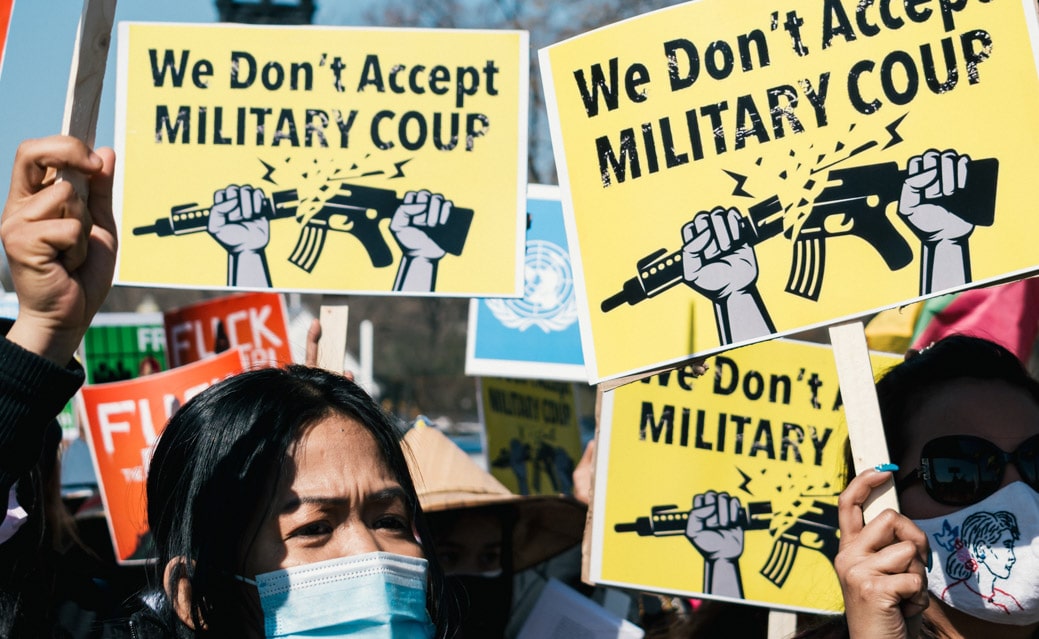Myanmar’s National Unity Government declares defensive war
The violent escalation highlights the bloody process of establishing democracy.
On February 7, 2021, I published an article for The Medium discussing the military coup that occurred in Myanmar on February 1. Over the course of the last eight months, since the coup and the arrest of State Counsellor and Nobel Peace Prize winner Aung San Suu Kyi, “1,046 civilians have been killed and 6,230 are currently detained.”
The remainder of Suu Kyi’s National League for Democracy administration and supporters—those who haven’t been killed or exiled—have secretly formed the National Unity Government (NUG) which is attempting to re-establish its governmental authority. “[The military Junta] are a failed coup and a failed regime. […] They cannot perform any functions of a government […] in healthcare, in education, in the economy,” said Dr Sasa, a cabinet member of NUG. The NUG has appointed international ministers and set up offices in places like Prague and Washington D.C. to gain international recognition and legitimacy in their operation.
However, no foreign governments have officially recognized the NUG, and they have only invited the military Junta members and their chief to attend international summits. But, many have claimed that the mere fact that foreign officials are communicating with the NUG, and have praised their continued fight for democracy, means they have established “more meaningful contacts than the SAC,” which is the State Administration Council, established by the military Junta after their coup. “The NUG is probably more organized than previous exiled governments, but they face similar challenges of legitimacy, and as the conflict drags on, relevance,” said David Mathieson, Myanmar expert and senior researcher for the Human Rights Watch.
After months of failed attempts at international recognition, on September 7, the NUG’s acting President, Duwa Lashi La, called on Myanmar’s citizens to launch a “People’s Defensive War” against the military Junta. “We have to initiate a nationwide uprising in every village, town, and city in the entire country at the same time” said La. Zaw Min Tun, the SAC’s spokesman, responded to this call by stating that the NUG is only spreading rumours and that people shouldn’t take it seriously. This declaration was made a week before the UN General Assembly in New York, where a decision was going to be made about the international response to the Myanmar conflict.
This declaration of civilian war is a drastic escalation after months of ceasefire between the parallel governments. China and Russia are the only two countries to officially recognize and initiate relations with the military government, whereas the U.S. and other countries have imposed sanctions and firmly stood against supporting the military regime. The NUG released a code of ethics for civilians, civil servants, student unions, armed groups, and administration members to abide by as they volunteer to be frontline fighters. This code includes the rejection of war crimes like torture and sexual assault of the enemy.
Inspired by the declaration of war, protests around the borders of Thailand and China re-ignited, and resistance fighters have banded together to form different civilian militias for different regions. “This is such an honor for us,” said one anonymous resistance fighter. Since the declaration, witnesses said they saw fighter jets and military troops deployed.
Within a week, fights between the Junta and the Kachin Independence Army broke out in Sagaing, the north-west region of Myanmar. Simultaneously, conflict also began between the Karen National Union and the Junta in the southern region of Tanintharyi. The local armed forces of the Magway region said they attacked five military targets. Hundreds of other smaller clashes have broken out throughout the country. There have been about 68 explosions in the country, which destroyed more than 80 military-controlled telecommunication towers and resulted in around 700,000 people losing internet access.
Amidst all this violence, the freedom fighter and country leader that all these democratic fighters are rallying behind—Aung San Suu Kyi—remains silent. All she had to offer was “no comment” in response to the war declared by her own party members and supporters. As I discussed in my last article, Suu Kyi claims to preach non-violence, yet, she defended the same military Junta prior to the coup on the violent war crimes committed against the Rohingya. Since her detention after the coup, she has attended several court proceedings for absurd accusations like “importing walkie-talkies illegally.” At least 20 soldiers have died since the war began, and more than 20 civilians have died too as result of the Junta’s retaliation in villages.
This sudden but expected escalation demonstrates the ugly process to achieve stable democracy in a nation. Conflicting and indecisive actions from the international community only contributes to the intensification of conflict. Empty support for the democratic movement by Western countries like the U.S. doesn’t really do anything substantial for the people of Myanmar; it only eases a little of the discomfort and guilt some Americans might feel as they watch the news. The lack of international news coverage on the events following the declaration of war exposes the performative and shallow interest the world shows in important humanitarian crises.
Affirmative and strong action needs to be taken in support of democracy, especially in a time when there is a rise of authoritarian leadership and overthrown governments. Although historically intervention by Western countries in Southeast Asian countries resulted in more bloodshed and the eradication of democracy, unfortunately, there doesn’t seem to be any other better ideas at the moment for Myanmar. And with the case of Aung San Suu Kyi, it’s even more complicated to choose to support her because on the one hand, she is the freedom fighter for democracy, on the other hand, she defends the genocide that democracies around the world condemn. In the end, the fact remains that a violent and inefficient military government is ruining the lives of millions, and we need to advocate for their lives more than ever.
Opinion Editor (Volume 48) | opinion@themedium.ca —
Aroni is a fourth-year student completing a double major in Political Science and English. She previously served as the Associate Comment Editor for Volume 47. Aroni is keen on enabling a safe and trusted space within the student body for students to critically think about issues that matter to them—both on a personal to global scale. Outside of studying, writing, and editing, she loves to dance to classic Bollywood tunes, cycle while listening to music or a podcast, write in her blog, and watch endless K-dramas on Netflix and Viu. You can connect with her on Instagram, LinkedIn, or her blog.


